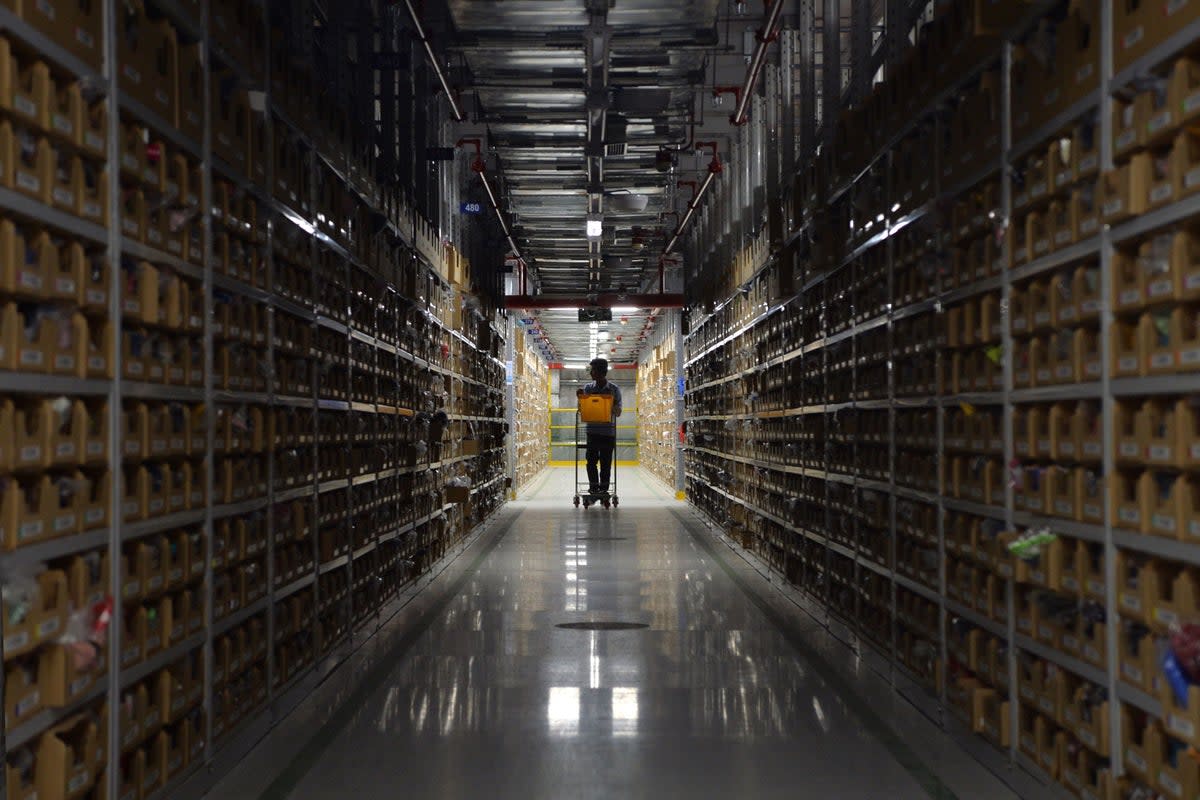Amazon workers ‘made to pledge not to take water or bathroom breaks’ during 50C heatwave

Amazon workers in an Indian warehouse were allegedly made to pledge they would not take any breaks, including to drink water or go to the bathroom, until they met their targets, even as the country reeled under an unprecedented heatwave.
As temperatures soared past 50C, workers at Amazon India’s Manesar warehouse, located in the northern state of Haryana, said they were finding it increasingly difficult to cope with the hazardous working conditions they claim were being ignored by the management.
One worker, who requested anonymity, described an incident on 16 May when warehouse employees were allegedly asked to work continuously without breaks in order to meet their targets.
“That day, we struggled to meet the target that was set, which was higher than usual; perhaps a sale was on, so products had to be moved to a different godown the same day. Around 4.30pm, one manager urged us to work harder, and then another manager instructed us to hold our arms out and pledge, ‘We will not take any breaks, we will not stop to drink water or go to the bathroom until we meet our targets.’”
In a statement to The Independent, Amazon maintained that the safety and wellbeing of their employees was paramount. “All Amazon sites have been equipped with heat index devices that constantly monitor changes in temperature,” the company said.
The worker admitted there were fans and large coolers at the warehouse but described their impact as “negligible”. “Walk just 10 steps away and you can barely feel any difference. The areas where we work are typically between 30-35C on any given day,” she said.
She said she spent her days organising products from 8.30am to 6.30pm, with only two 30-minute breaks.
Despite the intense heat, she, along with approximately 2,000 other workers at this warehouse, had to endure 10-hour shifts on their feet, struggling to meet what they described as unreasonably high targets. The lack of seating adds to the strain – all for a salary of around Rs10,000 (£94) per month.
The employee alleged that when women workers tried to rest in the bathrooms, the managers came looking for them.
“The designated break rooms are small and unbearably hot, so many female workers end up resting in the bathrooms during their breaks. However, managers come searching for us if they feel that we have stayed too long, pressuring us to return to work,” she said.

The difficult conditions are not limited to break areas. A male worker recounted instances when several colleagues had fainted from the intense heat but were given a paracetamol tablet and asked to go back to work after resting for 10-15 minutes. Workers in the areas where products and packages are loaded and unloaded from trucks face particularly harsh conditions.
“The trailers sit in the sun for two to three hours, making the interiors scorching hot. Yet we’re still expected to unload them in just five minutes,” he explained.
An Amazon spokesperson said: “Safety and wellbeing of our associates is of utmost priority for us. With several parts of the country witnessing inclement weather, all Amazon sites have been equipped with heat index devices that constantly monitor changes in temperature, and our teams implement appropriate corrective measures to provide comfortable working conditions.
“These measures include temporarily suspending work in areas reporting a high heat index. Our buildings are temperature controlled with HVAC solutions, have proper ventilation, offer adequate provision of water and ORS, and follow job rotation as well as work-rest cycles in case of high heat index.
“We are also sensitive to the needs of associates who may have prior health conditions, and our sites are equipped to provide additional emergency medical assistance to those who may need them, such as in cases of a heat stroke.”
During the ongoing heatwave, Amazon warehouse workers are forced to rest in locker rooms due to lack of proper facilities. AIWA urges Amazon to provide decent resting areas and implement immediate heat protection measures. ✊🏽#AmazonWorkers #Heatwave #MakeAmazonPay pic.twitter.com/wzblSraujb
— Amazon India Workers Association (@AiwaInd) June 4, 2024
Amazon India Workers Association (AIWA) convenor Dharmendra Kumar said these harsh working conditions have led workers to unionise in a bid to raise their demands, and alleged that complaints to Amazon and the labour ministry have resulted in no action.
“Despite many complaints to Amazon and the Ministry of Labour, no actions have been taken. Workers are enduring high temperatures in the warehouses, with recordings up to 34.2C in some areas,” Mr Kumar said.
These recent grievances were part of a broader struggle that Amazon warehouse workers have been engaged in globally. For the past four years, workers have participated in the “make Amazon pay” movement, demanding safer working conditions and better wages.
One of the ongoing issues has been Amazon’s stringent leave policy, which has led to workers having their IDs blocked for taking time off due to health reasons or emergencies without prior approval.
Nitesh Kumar Das, an organiser with AIWA, described the worsening conditions to The Independent: “Many workers are struggling in these conditions, seeking relief in inadequate places and facing difficulties in accessing basic necessities like water and breaks during busy periods.
“It’s imperative that companies like Amazon prioritise the welfare of their workers by implementing necessary safeguards, including providing additional compensation for working in high temperatures and ensuring access to hydration.”
In 2019, reports emerged that workers at an Amazon warehouse in the UK were having to urinate in plastic bottles rather than go to the toilet during their shifts. Union officials said they were taking action after more than 600 reports were made from Amazon warehouses to the health and safety executive in the past four years.
But a spokesperson for Amazon said at that time: “These groups are conjuring misinformation to work in their favour, when in fact we already offer the things they purport to be their cause – industry-leading pay, benefits, and a safe workplace for our employees. We can only conclude that the people who attend the events are simply not informed.”


